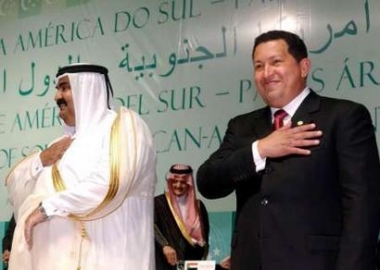Neike,
Paraguay
What is Hugo Chavez Up to in the Middle East?
By Mikhail Dinerchtein
Translated by Harry Kenneth Echevarria
August 28, 2006
Paraguay - Neike - Home Page (Spanish) 
 Chavez visits with Mahmoud Ahmadinejad in Iran (above),
Chavez visits with Mahmoud Ahmadinejad in Iran (above),
Syrian Dictator Bashar al-Assad in Syria (below) and the
Saudis (bottom). Is their strategy here? You bet.

 -----------------------------------------------------------------------------
-----------------------------------------------------------------------------
In
addition to Cuba, Venezuela was the only non-Arab state that considered Israel solely
responsible for the ongoing conflict in Lebanon. Given this, it was neither novel or a surprise when on August 4, 2006, Venezuela
withdrew its ambassador to Israel, Mr. Hector Quintero. But
in order to better understand this act, we should carefully examine Venezuela's global
strategy.
The foreign
policy of Hugo Chavez is based in "geopolitics," that is to say, that there exists a direct relation between natural
resources and foreign policy. We cab deduce then, that the foreign policy objectives
of this Caribbean state are focused mostly on economic interests. In this
sense, Venezuela's fortification of diplomatic relations with the Middle East,
Bolivia, Brazil, and the Asian Pacific are of the utmost importance, since in all
of these places either depend on the inflow of foreign investment, or on national
resources (mostly hydrocarbons), which are of the utmost importance for present
and future economic relations. It is for these reason that the first world tour of Hugo Chavez since he took office was symbolically centered
on the Middle East.
The Arab
companies of the Middle East already have invested 1 billion dollars in the
Caribbean state in construction, projects of manufacture of tractors and
energy. Most recent of these projects of investment, one talks about the Arab
aid to develop the Orinoco, crude a rich gas and zone in the coasts of
Venezuela.
He has also
encouraged Latin American integration using "energy." Recently, he
visited Byelorussia and Russia: two countries that have vast natural resources
in regard to energy. Nevertheless, Venezuela's greatest ally is Iran; a country
that has played host to Mr. Chavez on several occasions. This is because Iranian
investments are such a boon to the Venezuelan economy.
Arab
companies have already invested over $1 billion on construction projects, the manufacture
of tractors and on energy in the Caribbean state. The most recent of these
investment projects revolves around Arab assistance in developing the Orinocco
Belt  , a region rich in deposits of oil and gas, near the
country's coastal areas.
, a region rich in deposits of oil and gas, near the
country's coastal areas.
For this
reason, we can say that it was no coincidence that Venezuela withdrew its
ambassador from Israel, since the move was part of a geopolitical strategy to win
points with the Arabs.
In this
way, the State of Israel is a suitable pretext for Mr. Chavez to articulate a
foreign policy toward the Middle East sure to win the sympathies of his
petroleum associates, and appears to be a very rationally arrived at strategy.
Although it is hypocritical and comes at the cost of his relations with Israel,
Hugo Chavez will obtain larger investments from the Arab world in his energy
sector, particularly in the Orinoco Belt.
Spanish Version Below
La Geopolítica de Hugo Chávez
Por
Mikhail Dinerchtein
August
28, 2006
Además de
Cuba, Venezuela fue el único país no árabe en considerar al Estado de Israel como el único responsable del presente conflicto con Líbano.
Es así, que el retiro del embajador de Venezuela en
Israel, Héctor Quintero, el 4 de Agosto, no fue ninguna novedad ni sorpresa.
Para entender este acto debemos estudiar más a fondo
la estrategia internacional de Venezuela.
La
política exterior de Hugo Chávez esta basada en la 'geopolítica', es decir, que
existe una relación directa entre los recursos naturales y la política
exterior. Podemos deducir entonces, que el objetivo de la política
internacional del estado caribeño esta enfocado, en
gran medida y principalmente, a intereses económicos. En este sentido, el
fortalecimiento de las relaciones diplomáticas venezolanas con el Medio
Oriente, Bolivia, Brasil y Asia Pacifico son trascendentales, ya que todos
estos cuentan con capacidad de inversión o con recursos Naturales
(principalmente hidrocarburos), los cuales son esenciales en las relaciones
económicas presentes y futuras.
Es así,
que la primera visita internacional de Hugo Chávez, después de haber llegado al poder, fue simbólicamente realizada al
Medio Oriente.
También ha fomentado la integración latinoamericana a través de la
energía. Recientemente, realizó visitas a Bielorrusia y Rusia, dos países
que tienen vastos recursos naturales energéticos. Sin embargo, el mayor
aliado de Venezuela es Irán, un país que ha recibido
la visita de Hugo Chávez en repetidas ocasiones, ya que las inversiones iraníes
son de gran utilidad para la economía venezolana. Las compañías Árabes del Medio Oriente ya han invertido 1 mil millones de dólares
en el estado caribeño en construcción, proyectos de fabricación de tractores y
energía. El más reciente de estos proyectos de inversión, se refiere a la ayuda
árabe para desarrollar el Orinoco, una zona rica en crudo y gas en las costas
de Venezuela.
De esta
forma, no es casualidad que Venezuela haya retirado al embajador de su país en
Israel como parte de una estrategia geopolítica para
ganar la aprobación árabe. En este sentido, El Estado
de Israel es el pretexto idóneo de Chávez para articular una política exterior
hacia Medio Oriente que gane simpatías frente a los socios petroleros, en lo
que parece ser una estrategia racionalmente preparada. Hipócrita pero un hecho, a costa de su relación con Israel, Hugo Chávez
conseguirá mayores inversiones del mundo árabe en el sector energético,
particularmente en el Orinoco.